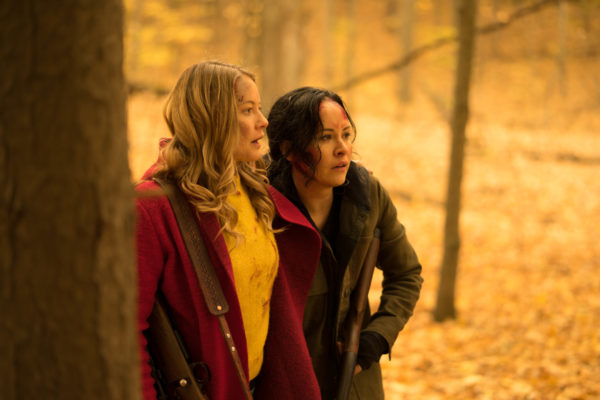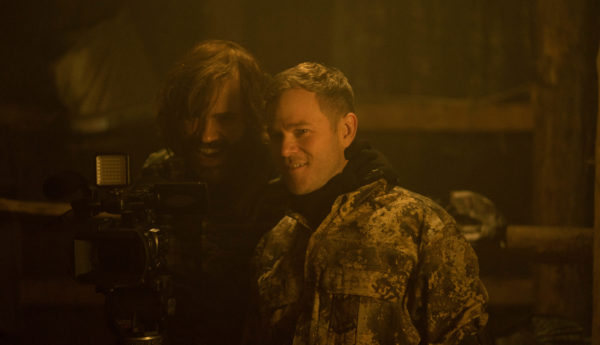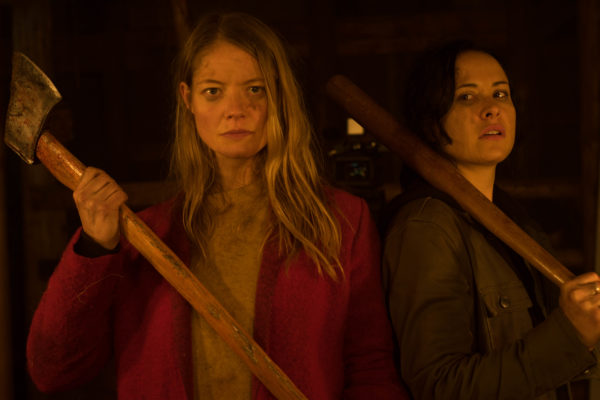
The Retreat asks the question: what dangers lie in wait for queer people who leave the safety of the big city?
The first act of The Retreat is pretty engrossing. After a tense opening sequence wherein something occurs to boyfriends Scott (Chad Connell) and Connor (Munro Chambers) at a country Air BnB, the film cuts back to city and girlfriends Renee (Tommie-Amber Pirie) and Val (Sarah Allen). Their relationship is cute, but they haven’t really sorted out their long term goals: Renee can barely work Val’s coffee maker, much less discuss their future.
Their weekend getaway is something of a relationship litmus test. Renee is meeting Val’s friends for the first time and she’s uncomfortable while Val is looking for proof of commitment. These are relatable issues, and the dark vs light colour contrast between the women (in both hair colour and costuming) establishes them as an “opposites attract” couple. This is further solidified when they stop for gas at a rural gas station and Renee barely acknowledges Val as her girlfriend when Val is hit on by James (Aaron Ashmore), a charming, albeit pushy, stranger. Female-identifying audience members will immediately recognize James’ duplicity; one of the strengths of screenwriter Alyson Richards‘ script is that she understands how different and occasionally terrifying the world is for women (particularly queer women) compared to men.
When Renee and Val reach the same cottage from the opening scene, the slowly mounting dread ratchets up another notch. There are warning signs that something is afoot: Connor’s a neat freak like Val, but his suitcase is upended on the bed and Renee finds dirt marks on the floor. The women shrug it off because they don’t want to believe something is wrong, even though they’re clearly away something’s not quite right. They continue to do so throughout a walk in the woods and a picnic in a field…until the threat becomes too ominous to ignore.
What follows is a great sequence as the women are hunted and attacked in the dark. The way that queer director Pat Mills shoots this first act, and especially these scenes, is scary and violent. The audience is right there with Renee and Val because we’ve spent a good amount of time with them and gotten to know them.
Sadly when the question of who is doing this to them and why is answered, the reveal is both simple and obvious. James, along with couple Gavin (Rossif Sutherland) and Layna (Celina Sinden), are using the cottage to lure in queer city people because they disagree with their lifestyle. And if Renee and Val are going to survive the weekend, they’ll need to fight back.
That’s it.
That’s the whole premise.

Queer screenwriter Richards has undoubtedly come up with a topical premise: what dangers await queer people when they leave behind the large, gay-friendly metropolis for the relative uncertainty of the country? Considering the political colour palette of the United States, which features no shortage of Blue cities in Red States, it’s easy to forget how quickly the level of acceptance drops outside the city limit (To clarify: The Retreat is Canadian, but the argument still applies).
Where the film struggles, however, isn’t with the concept; it’s the fact that The Retreat doesn’t do more with it.
Unfortunately the film is painting in broad, obvious strokes with not enough nuance. Take, for example, the fat man in ill-fitting clothes manning the country gas station. He’s a stereotypical “rural” character: a harbinger that the women are not (safe) in the city anymore. It’s comparable to countless other horror films, but presented without irony or an awareness of how reliant on tropes it is.
This tendency to favour the obvious is more problematic when it comes to The Retreat‘s shallow and unmemorable villains. Not only are they barely named, they’re basically garden variety homophobes who just hate queer people. This simple motivation, sadly, isn’t that uncommon in the real world, but in The Retreat it does little to help establish the antagonists. These aren’t characters – they’re little more than one dimensional cartoon cut-outs because we don’t know anything about them except their prejudice.
It’s an issue because it reduces the film to an overly simplistic “bigots vs queers” narrative. In order to make this revenge tale work, the villains need to be established well enough so that the audience cheers for their downfall. Ashmore, Sutherland and Sinden have nothing to work with, so when it comes time for Renee and Val to fight back, it simply plays like two women hacking and shooting non-descript people. Is it satisfying to see a pair of queer women killing bigots? Absolutely…but it doesn’t feel that much different from the countless other horror films where women fight back against their oppressors.
Add to this the fact that the logistics of the set-up, which suggests a small scale version of Hostel‘s Elite Hunting Club, don’t hold up under scrutiny. It’s a small, but significant issue because it infers a much larger operation – and therefore a broader economic and political element – that the film doesn’t care to explore.

If this was a Canadian entry in the Hillbilly horror subgenre, then the film could actually embrace its shallow dichotomy of urban vs rural, progressive vs conservative, etc. This would allow The Retreat to engage in the more sensational survivalist elements that it teases in the first act, which suggests that Renee is a badass who was taught from an early age to shoot and track game. This never comes to anything, though (in fact Val is as adept at fighting as Renee when the time comes), so dropping those breadcrumbs is a tease for a more exciting film that we never get.
The issue is that Richards’ screenplay can’t decide if it wants to be an exploitation film about urban lesbians turning the table on rural bigots or a thriller that critically unpacks (and possibly even criticizes) upper middle class queers who venture into unwelcoming spaces.
The final result is somewhere in between. The political commentary is too surface-level and obvious and the action is too restrained. The Retreat either needed to be more sensational and bombastic (let these women really cut loose) or it needed to say something more than “country people hate gays”.
At best, The Retreat is a too-familiar revenge film that is well shot and acted. It also features some solid action in the last act.
At worst, it’s a politicized genre film that doesn’t actually seem interested in exploring or unpacking its premise.

Considering the proliferation of challenging and complicated queer horror texts in the last decade, there’s nothing particularly revelatory or surprising about the idea that queer people are vulnerable targets for bigoted homophobes. That’s a given. That’s simply stating a fact.
The problem is that The Retreat stops there. This is simple; it’s fine.
But it’s also safe…disappointingly safe.
3/5